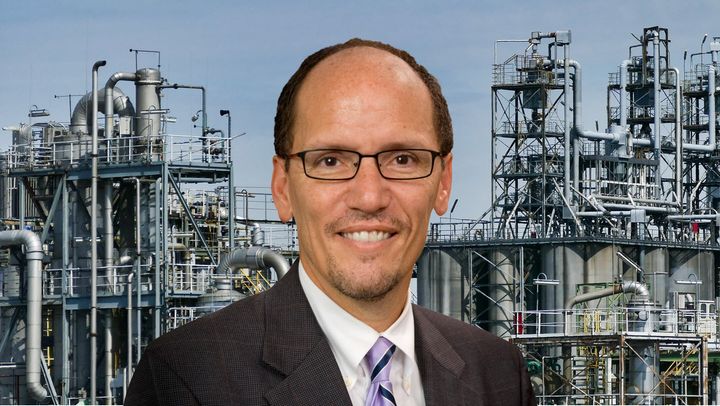The Democratic Party has a special relationship with Seattle-based law firm Perkins Coie. The Democratic National Committee and dozens of Democratic campaigns and PACs spend tens of millions of dollars each election cycle to employ the services of the firm, and there is a constantly spinning revolving door between its offices and Democratic administrations.
But as the party fills up Perkins Coie’s coffers and Perkins Coie staffs up with consultants who have access to the upper echelon of the Democratic establishment, the firm is lobbying for the fossil fuel industry to fight climate change policies that many Democrats support. The party’s deep ties to a major oil and gas firm stand in contrast to its pro-environmental image and hinder the party platform’s call to “accelerate the transition to a clean energy economy.”
Perkins Coie has an extensive oil and gas practice. “From the wellhead to the burner tip, we have decades of experience addressing the legal issues related to the exploration, production, transportation and storage of crude oil, natural gas, petroleum products and coal bed methane,” it says on its website. Its clients have included Texaco, Baker Hughes, Northwest Natural Gas, Conoco, TransCanada and Valero.
The primary focus of Perkins Coie’s fossil fuel lobbying in recent years has been working with the Trump administration to secure waivers from the requirements of the Renewable Fuel Standards program, or RFS, for oil refineries.
Passed by Congress in 2005 and expanded in 2007 as part of the Democrats’ 100-Hour Plan, the RFS program aims to reduce greenhouse gas emissions and U.S. dependence on foreign oil supplies by requiring transportation fuels to be blended with fuels made from renewable sources like ethanol and biodiesel.
Since 2017, Perkins Coie attorney LeAnn Johnson Koch has lobbied the government for the Small Refinery Owners Ad Hoc Coalition, which is affiliated with fossil fuel companies Delek, Calumet Specialty Products, and Hunt Refining. Specifically, Koch has worked to secure small refinery hardship waivers from RFS requirements for her clients and to get the Environmental Protection Agency to keep refineries’ waiver requests secret. Koch and the companies she represents argue that the RFS rules cause them untenable financial hardship and that their waiver applications contain confidential business information.
Koch has also lobbied on the RFS program for Mississippi-based refinery Ergon and Philadelphia Energy Solutions, the former operator of a facility in South Philadelphia that was the largest and oldest refinery on the East Coast. Philadelphia Energy Solutions’ refinery exploded and burnt down in June 2019 because of a leaky pipe, releasing 5,239 pounds of toxic hydroflauric acid into the atmosphere. Emails obtained by the Sierra Club show that Koch pleaded with the EPA to secure a RFS waiver for Philadelphia Energy Solutions in 2017 as the company was facing bankruptcy prospects.
Perkins Coie attorney Brian Potts has argued for scrapping the renewable fuel standards while keeping fossil fuel subsidies intact, writing in an op-ed that “doing so would improve the environment, while simultaneously boosting domestic oil and gas production and eliminating a huge, unnecessary drag on our economy.”
Under the Trump administration, the RSF waivers have more than quadrupled the number given out by the EPA under Obama. And it’s not just small companies getting small refinery waivers. Oil giants ExxonMobil and Chevron were awarded small refinery waivers in 2018.
According to House testimony from Renewable Fuels Association President and CEO Geoff Cooper, the waivers issued by the Trump administration have reduced blending requirements for a total of 4.04 billion gallons of transportation fuel. A Department of Energy fact sheet states that “Biofuels burn cleaner than gasoline, resulting in fewer greenhouse gas emissions, and are fully biodegradable, unlike some fuel additives,” noting that “Cellulosic ethanol has the potential to cut greenhouse gas emissions by up to 86%.”
Meanwhile, Democrats in Congress, including those who have paid Perkins Coie for legal counsel, have been fighting the waivers. In an August letter to the EPA, Sen. Dick Durbin (D-Ill.) and six other Senate Democrats, including Sen. Amy Klobuchar (D-Minn.), called on the Trump administration to end its abuse of small refinery waivers, which are only supposed to be available for refiners that process less than 75,000 barrels per day.
In December 2019, Perkins Coie hired lobbying firm Cassidy & Associates to represent them and their client, the Mountain Valley Pipeline. The pipeline, a project of EQM Midstream, NextEra Energy, Consolidated Edison, and other natural gas companies, is seeking approval for construction across the Appalachian Trail, which has protected status as a national park.
Nearly all of the moderate Democrats who ran for president in 2020 paid Perkins Coie, including Sen. Kamala Harris (D-Calif), South Bend, Indiana Mayor Pete Buttigieg, Sen. Cory Booker (D-N.J.), and John Delaney. Sen. Elizabeth Warren (D-Mass.) also hired the company. Among the candidates not using Perkins Coie for legal services are former Vice President Joe Biden and Sen. Bernie Sanders (D-Vt.).
The fossil fuel industry is not the only strange bedfellow for the Democrats’ favorite law firm. Another Perkins Coie client, Amazon, is notorious for opposing workers’ rights to unionize. Last April, Amazon landed on the National Council for Occupational Safety and Health’s “dirty dozen” list of most dangerous places to work in the U.S. due to repeated safety violations. The party platform says that workers “who have been mistreated should never be denied their right to fight for fair treatment under the law” and that “Americans should earn at least $15 an hour and have the right to form or join a union.” Amazon has repeatedly crushed its workers’ attempts to form unions since its founding in 1994.
And while the Democratic Party often criticizes Republicans for their ties to Big Money interests and megadonors like Charles Koch, Perkins Coie has played a major role in deregulating campaign finance laws so that wealthy individuals and corporations can more easily pump money into the political system. Marc Elias, firmwide chair of Perkins Coie’s Political Law practice, was the author of a provision passed by Congress in 2014 that greatly expanded the amount of money individuals can give to national party committees each year. In 2010, Elias and Perkins Coie filed an advisory opinion request with the Federal Election Commission (FEC) that led to the creation of super PACs with the ability to raise and spend unlimited amounts of cash on political expenditures like ads.
Perkins Coie also works with hawkish defense companies like Honeywell and Boeing, pharmaceutical companies that are members of trade groups opposing the Democrats’ drug pricing reforms, and Facebook, for which it helped lobby the FEC for an exemption from political advertising disclosure rules.
Related:



